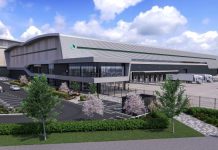The industrial and logistics sector remains the unsurprising star turn in the commercial property market in the Eastern region in 2020, with other sectors falling away largely due to the prevailing drift of already established global trade trends and reinforced by the obvious impact of the Covid-19 pandemic.
That, in summary, is the experience of the past twelve months by leading chartered surveyors and commercial property experts, Barker Storey Matthews – whose integration with Eddisons completed last month (November) following acquisition last year (2019).
In reviewing the activities of its agency reach across the Eastern region from offices in Peterborough, Huntingdon, Cambridge and Bury St Edmunds, Eddisons incorporating Barker Storey Matthews (as the firm is now badged) points to the leading role the industrial sector, in which logistics sit, has played in being fuelled further by business lockdown phases which have characterised all quarters of the trading year.
The phases of lockdown resulted in huge surges in online orders and deliveries which has also led to enhanced investor appetite in the industrial sector.
Investors seeking freehold opportunities have focused even more attention on the industrial sector this year as the appetite for retail investments and offices wanes.
The regional sense of the market in 2020 has been reflected in the micro-markets in which its local offices are so active.
Industrial stock levels remain at an all-time low in Peterborough.
Eagle Business Park in Yaxley continues to perform in meeting demand in this sector with the new build schemes of its second development phase.
Heron Court has been completely let and sold in 2020 and Slater Court is 90 per cent under offer prior to practical completion before the year’s end. Many units at two schemes coming on stream in 2021 are already reserved off-plan.
While the office market has slowed, office occupiers reviewing their requirements have made the 1,500 sq ft market a little more buoyant than pre-Covid-19.
The year has seen a number of small new industrial development schemes serve the local markets around Huntingdon and the local office is instructed on a number of similar small schemes set to be underway for occupation at the end of 2021.
The completion of the A14 upgrade sees improved transport links between Huntingdon and Cambridge now affording a viable opportunity for technology and R&D occupiers to take advantage of relatively competitive rents in this important corridor. There are a number of active enquiries from technology firms looking for such opportunities.
Investor appetite remains in Cambridge – evidenced by a number of current ‘live’ deals where achieved prices are 10-20 per cent above asking prices and that range is not untypical.
Prime office areas are holding up as supply is tight but occupiers are looking for more flexibility. Unsurprisingly, smaller serviced offices look set to come in to play more in the coming year (2021).
Equally unsurprising is the resilience of the laboratory market, with the traditional science park locations in and around the city as in demand with niche occupiers as ever.
Across the whole Eastern region and to date, deals concluded with occupiers across this year are down on 2019 by around 15 per cent.
Notwithstanding the problems in the wider economy caused by the pandemic, the figure represents a resilient property sector. More remarkable is that prices and rents have continued to rise, largely as a result of a chronic shortage of space in the market.
How long this will continue remains to be seen but the Eastern region, as a whole, has not yet seen large scale vacancy issues – albeit the retail sector will, inevitably, give rise to more concern in the coming months as we enter 2021.
Before faced with problems caused by lockdowns, many occupiers were reluctant to cite BREXIT as an explicit reason to abort a move. But the inevitable end of the transition phase of BREXIT – and whatever follows – will remain an influence on some business occupiers’ decision making in looking to the other side of the pandemic.
The chorus of high street chain failures will continue to affect retail property fortunes and, unfortunately, this may well be joined by the leisure sector as many firms are struggling with the impact on trading.
In general, the office market has turned from a ‘patchy’ performance, in to one of uncertainty as firms get to grips with shifting patterns of work, primarily working from home (WFH).
Interestingly, however, Eddisons incorporating Barker Storey Matthews is seeing more enquiries in the Eastern region as companies consider relocation from larger, metropolitan cities. This is a trend expected to continue forward to 2021, at least in the short term.
Larger companies are also focusing on adapting offices to provide more conferencing and meeting room facilities. They are also looking to host reduced desking to allow for the WFH environment but, in doing so, want to offer staff better quality facilities for the reduced hours expected in the corporate facility.
In saying that, there is the expectation of some migration back to office space in the coming year, especially to cater for younger workers who see the office environment as a good place for social interaction, mentoring and training.
In summarising the Eddisons incorporating Barker Storey Matthews’ 2020 market view and in looking ahead to the coming twelve months, Stephen Hawkins, Partner at Eddisons, said, “At this time last year, we said that 2020 would have similar economic and geopolitical forces bearing down as those of 2019.
“We pointed to the steadiness of investment in bricks and mortar in retaining its long term investment appeal – no matter how much of another rollercoaster ride the month to month experience of 2020 was sure to be.
“We stand by both forecasts.
“But 2020 has been one hell of a year and we are still not out of the woods yet – albeit the welcome promise of national vaccine roll-out. But its fulfilment will be critical.
“The commercial property market will, inevitably, have its issues but we are confident that, in overall terms, our region will emerge out of 2021 in pretty good shape.
“There will be casualties but we are probably in one of the best, if not the best, region in which to be located as this unprecedented year turns.”



















